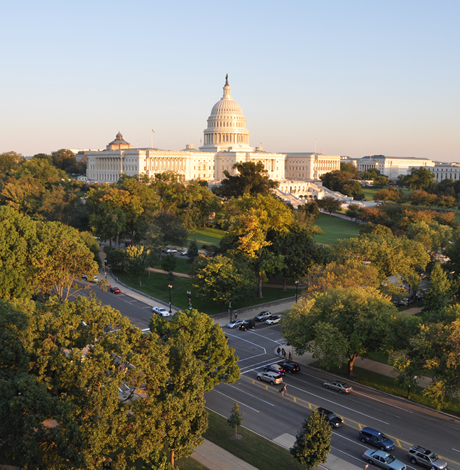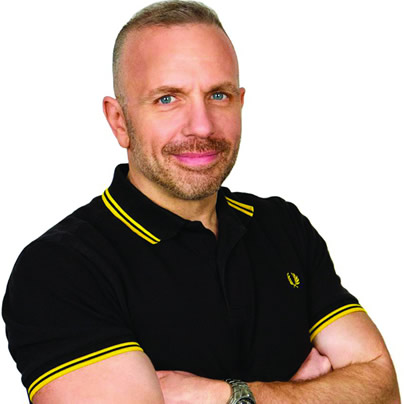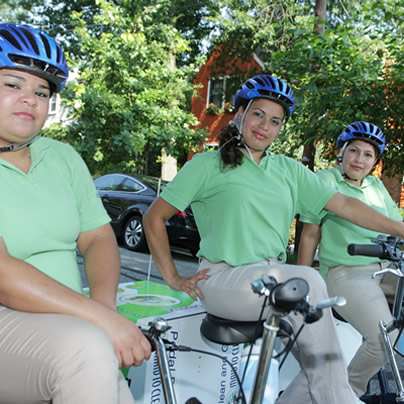Local
Local firm working toward a greener D.C.
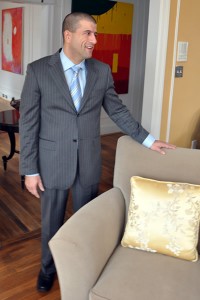
Local gay businessman Joe Andronaco said his sexual orientation was never an issue in the workplace. (DC Agenda photo by Michael Key)
Ask someone how to save the earth from ourselves and you likely will get a range of advice. Trade your gas-guzzler in for a fuel-efficient hybrid vehicle, or better yet, an electric car. Attach solar panels to the roof of your home and use them to wean your house off of non-renewable resources. Invest in tree replanting efforts.
Local gay businessman Joe Andronaco has a less expensive, though admittedly less sexy suggestion that he says will not only have a greater collective environmental impact, but will also end up saving you money before too long: have your home inspected for energy inefficiencies, and take steps to address those inefficiencies.
“Conservation is something that doesn’t require new technologies or a major investment,” said Andronaco. And with an estimated 75 percent of the city’s carbon emissions coming from building energy use, the potential environmental benefit “is huge.”
Andronaco not only sees value in conservation, he also believes there is a good business opportunity there. Last year, he helped launch a company called Access Green, which conducts home energy audits in the greater Washington area. The company’s base product, the knowledge audit, provides homeowners with valuable information about their home – where air is coming into the house, which appliances are creating dangerous chemical emissions, and how their energy consumption stacks up against comparable dwellings, to name but a few of the items addressed in the audit.
“One of the biggest issues with green,” observed Andronaco, “is follow through. You can talk green all you want but are you going to get it done?”
For those who choose the company’s premium product, the fulfillment audit, Access Green technicians will come to your home and make some of the repairs and upgrades recommended in the knowledge audit, from changing out HVAC filters to caulking windows and doors. It is this marriage of green advice and implementation that Andronaco says sets his company apart as an innovator.
“We come with a trades knowledge to green,” said Andronaco. “We know how to practically do the things that will achieve the savings. There are lots of inexpensive, couple-hundred-dollar items that can save you thousands.”
Access Green is part of a larger corporation called USA Technologies, a $12 million business that Andronaco has led since 2003. The well-known local commercial heating and air conditioning company Argent, which received the Angie’s List Super Service Award for the past two years, is also part of USA.
“We really take a whole house approach to the way we do systems,” explained Andronaco. “Before you do something like put a new heating or air conditioning system into your home, you really need to do a whole house analysis.”
Access Green is the first company that Andronaco himself has launched, along with lawyer David Julyan and environmental lobbyist Sam Brooks, known by many locally for his spirited attempts a few years ago to win a seat on the D.C. City Council. Brooks and Julyan are principals of 360 Green, a firm that markets green knowledge and services to the business community.
Andronaco was born in Caracas to a Venezuelan mother and an American father. The family moved to Miami when Andronaco was eight and he lived there until going to the University of North Carolina at Chapel Hill to get a degree in history. He got his start in business while working for local utility giant Washington Gas. After leaving D.C. briefly to get his MBA from the Wharton School of Business, which he received with honors, Andronaco came back to D.C. and again worked for Washington Gas before leaving to pursue his dream of being an entrepreneur.
Though Andronaco has been openly gay since his days at business school, his sexual orientation isn’t something that he trumpets in the workplace. So imagine Andronaco’s surprise when his mentor, USA founder Mike Berard, an elderly, staunchly Republican, Vietnam veteran he befriended while working at Washington Gas, called Andronaco into his office to discuss Andronaco’s “lifestyle.”
“He goes, ‘I’m not going to have someone run my business and be in a closet.’ I said, ‘Mike, some people might be offended.’ He said, ‘I don’t give a shit. If they have a problem, I’ll fire them.’”
Aside from one of the company’s top salesmen expressing misgivings about how company morale would fare with a gay man in charge, a line of questioning that Berard quickly shut down, Andronaco said he has received zero negative reaction in the workplace.
“Most people thought that especially these sort of roughneck good ‘ole boy electricians and HVAC guys would have issues, but they don’t,” said Andronaco. “People are multi-faceted and you can’t take them for caricatures that are created by the media and even by ourselves.”
The 43 year old is quick to stress that being gay is just one facet of who he is, and he is extremely active in the wider community. He sits on several local boards of directors, including Goodwill and the Boys & Girls Club of Greater Washington, and is active with the Gay & Lesbian Victory Fund as well. He is also on the D.C. Mayor’s Green Collar Jobs Advisory Council and the Sustainable Energy Utility advisory board, which partners with the D.C. Council to administer sustainable energy programs. In 2008, he was recognized by the Washington Business Journal with a Greater Washington Minority Business Leader Award.
A proud D.C. resident, Andronaco lives with his partner in the Northwest neighborhood of Crestwood. Their 1925 Dutch colonial home doubles as a training and demonstration facility for his company. Earlier this week, in fact, Andronico’s colleagues at Argent used his house to demonstrate how to install programmable thermostats.
Andronaco is also a strong supporter of the city and he sees expansion of the green economy as a way to boost the District’s tax base and address its high unemployment rate. He made a conscious choice to base Access Green in the District, along the H Street corridor in Northeast, and said he likewise makes a point of hiring city residents.
Access Green conducted more than 200 home energy audits last year. According to Sara Loveland, who left her job at D.C. Greenworks last year to be Access Green’s chief operating officer, 2010 is already off to a strong start.
The company is working with the Corcoran on its green roof and recently it scored a contract with the Southern Maryland Electric Cooperative to be the sole provider of home energy audits for SMECO clients in Prince George’s and Calvert counties. They are also busy supporting legislation before the D.C. Council right now that would simplify funding options for energy efficiency improvements and renewable energy products.
“The homeowner wouldn’t have to go through a credit application as long as they have equity in their home,” explained Brooks. “If they move before the loan is paid off, it’s attached to the house and stays there. “ This is an innovative way to finance energy improvements, particularly for homeowners, that Brooks said will solidify D.C.’s place at the leading edge of the green movement.
Brooks is quick to note that this legislation is one of the rare instances where the public interest is perfectly in alignment with the interests of “green collar” businesses like his, a trend he sees continuing.
“The better a firm like ours does,” he said, “the closer the government comes to realizing its object to reduce the city’s carbon footprint.” Moreover, he added, there is opportunity here for private sector companies like Access Green to provide market-based solutions to environmental challenges, rather than rely wholly on the government for leadership.
Said Loveland: “People are so dazzled by super sexy projects like solar paneling. Not enough attention is paid to conservation. We can generate all the alternative energy we want, but without conservation we won’t achieve the results we need to meaningfully reduce our carbon footprint.”
The Access Green knowledge audit currently runs $249 while the fulfillment audit starts at $599. For more information on Access Green’s products, visit http://www.greenerhome.com or call 202-559-6061.
Maryland
Silver Spring holds annual Pride In The Plaza
‘Today means inclusion. It means to build resilience’

Silver Spring’s annual Pride in the Plaza event took place on Sunday to celebrate the LGBTQ community and emphasize inclusion and resilience.
“Today means inclusion. It means to build resilience, love,” Robyn Woods, program and outreach director for Live In Your Truth, which organized the event, said. “I mean, just being surrounded by the community and so many great entrepreneurs, business owners, and just being a part of this whole rainbow coalition that we call the LGBTQIA to be about.”
With the event being her first time organizing for Live In Your Truth, Woods said she felt emotional to see the support and love at the event.
“Some people (are) bringing out their children, their babies, their grandparents,” Woods said. “It’s a lot more allies here than anything else. That type of support to me means so much more than just support from my community; just outside support, inside support, so much support around it, so much love. Everyone’s smiling outside, helping each other.”
Attendees of the event were able to head over to the Family Fun Zone, an air-conditioned Pride Cool Down Lounge, or watch live drag performances in the main stage area.
Along with entertainment and a shaved-ice stand, rows of information tables stood along the plaza, including FreeState Justice, the Washington Spirit, Trans Maryland, Moco Pride Center, and the Heartwood Program, an organization that offers support, therapy, education, and resources to the LGBTQ community.
“I want people to know about our services, and I love what we have to offer,” Jessica Simon, psychotherapist for Heartwood Program’s Gender Wellness Clinic, said. “I (also) want to be part of a celebration with the community, and so it feels good to be here with other people who have something they want to give to the community.”
She added that within today’s political climate, to which she called an “antidote to shame,” it’s important to be celebrating Pride.
“There’s a lot of demonization of LGBTQI people,” Siena Iacuvazzi, facilitator for Maryland Trans Unity, said. “(Pride) is part of the healing process.”
Iacuvazzi said she was taught to be ashamed of who she was growing up, but being a part of a community helped her flourish in the future.
“I was taught how to hate myself. I was taught that I was an abomination to God,” she said. “But being a community is like understanding that there are people who have experienced the same thing, and they’re flourishing. They’re flourishing because they’re willing to stand up for themselves as human beings and discover themselves and understand what’s true for themselves.”
She added that Pride allows for a mutual understanding to take place.
“It’s more of a sense of belonging … and just taking that home and understanding you’re not alone,” Iacuvazzi said. “We’re each taking our own journey — we’re not putting that on each other. It’s just walking away with a sense of belonging and humanity.”
Similar to Iacuvazzi, Woods said she hopes attendees’ biggest takeaways would be family, fun, resilience, and pride.
“Being proud of yourself, being happy for who you are, and representation and how much it matters,” she continued. “And I think all these young people that are walking around here get to see versions of themselves, but older. They get to see so many different lesbian, gay, bisexual, pansexual people that are successful, that are showing love, that care, and it’s not how we’re portrayed in the media. It’s lovely to see it out here. (It’s) like we’re one big old, happy family.”
Virginia
Spanberger touts equality, reproductive rights in Arlington
Democratic Va. gubernatorial nominee made campaign stop at Freddie’s Beach Bar
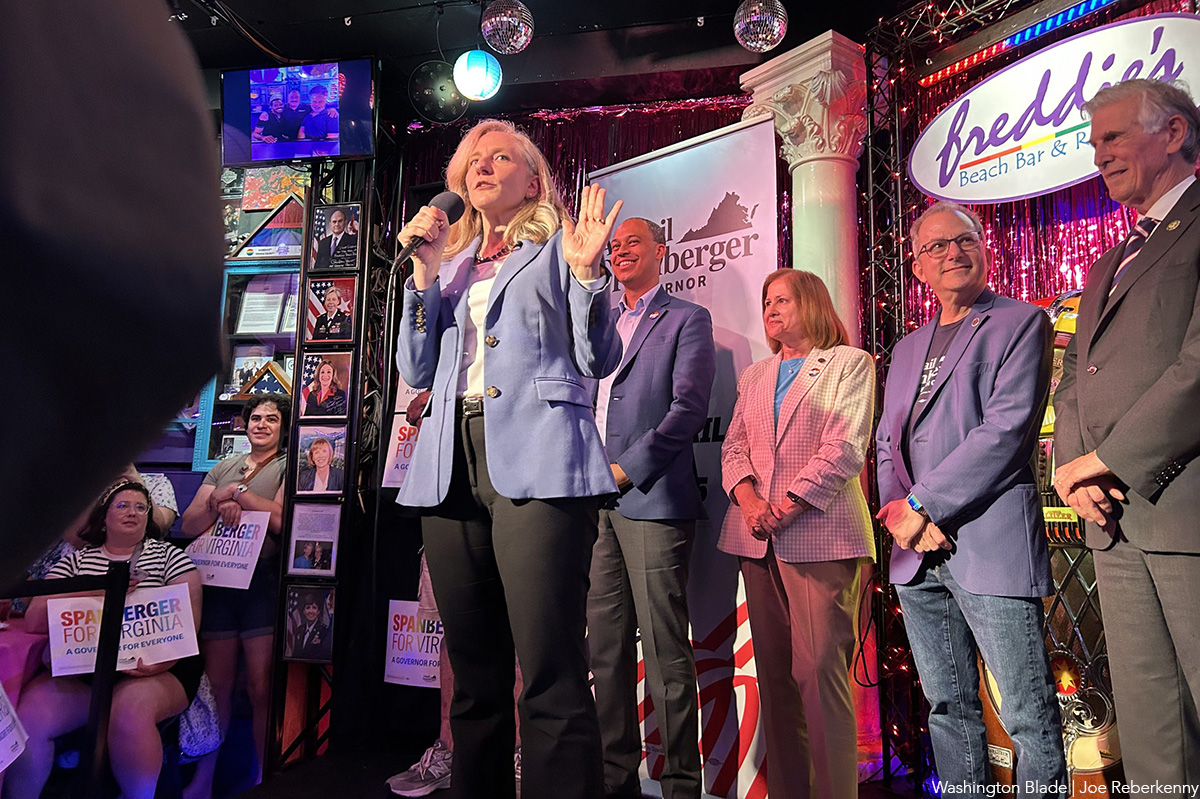
With the general election heating up and LGBTQ rights under increasing threat nationwide, Virginia gubernatorial candidate Abigail Spanberger brought her “Span Virginia Bus Tour” to Arlington’s Freddie’s Beach Bar for a campaign stop filled with cheers, policy pledges, and community spirit.
Spanberger, who served three terms in the U.S. House of Representatives from 2019 through early 2025 for Virginia’s 7th Congressional District, also served as a federal law enforcement officer specializing in narcotics and money laundering cases, and as a CIA case officer working on counterterrorism and nuclear counterproliferation.
Spanberger is running against Republican nominee Winsome Earle-Sears, the current lieutenant governor of Virginia, who said she was “morally opposed” to a bill protecting marriage equality in the commonwealth.
She was joined by other Democratic candidates and supporters: lieutenant gubernatorial candidate Ghazala Hashmi, attorney general candidate Jay Jones, Virginia state Sen. Adam Ebbin (D-Alexandria), and Congressman Don Beyer.
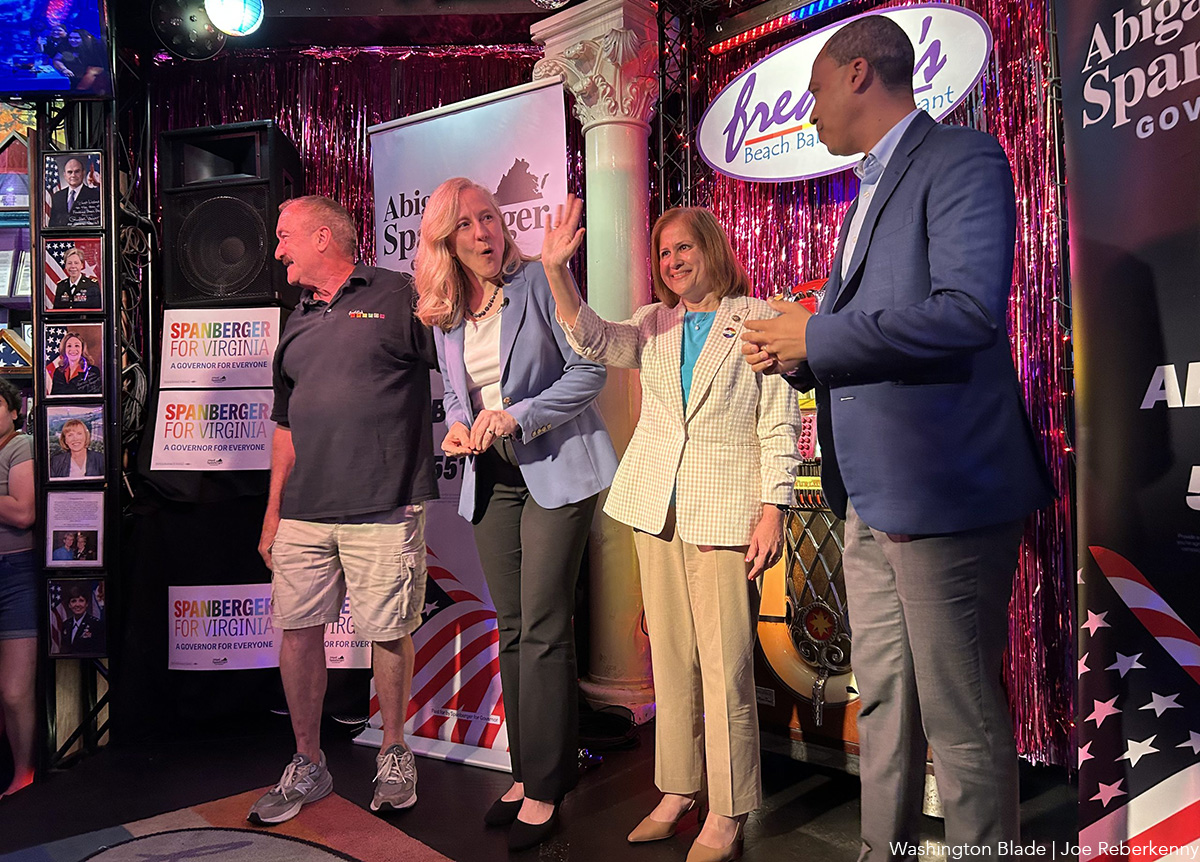
Freddie’s was packed wall-to-wall with supporters, many of whom wore “Spanberger for Virginia” shirts in the progressive Pride flag colors. In her speech, she made it clear that LGBTQ Virginians’ rights are on the ballot this year.
“I’m so excited to be here, and I am so grateful to the entire staff of Freddy’s for letting us overtake this incredible venue that is not just an awesome place to come together in community, but is a symbol to so many people of joy, of happiness, of community and of celebrating our friends and our neighbors,” Spanberger told the packed restaurant. “It is exciting to be here, and particularly during this Pride month, and particularly as we reflect on the 10-year anniversary of Obergefell and the reality that we still have so much work to do.”
“The reality is there are so many people who still would be inclined to take us backwards,” she said. “In this moment when we see attacks on people’s rights, on people’s humanity, on Virginia, on our economy, on research, on public education, on food security, on health care, on Virginians, on their jobs, on public service and on people — it can get heavy.”
“What it does for me is it makes me want to double down, because once upon a time, when I was talking to my mother about some horror show or sequence of activities coming out of a particular administration, she did not really have the patience to listen to me and said ‘Abigail, let your rage fuel you’ — and the conversation was over. And so I reflect on that, because, in fact, every day there is so much fuel to be had in this world and in this moment.”
One of the points Spanberger continued to emphasize was the importance of steadfast state government officials following the election of President Donald Trump, which has led to rollbacks of LGBTQ and bodily autonomy rights as a result of the conservative-majority U.S. Supreme Court.
“What the past few years have shown us is that a Supreme Court decision, no matter how many years we have celebrated its existence, does not protect us in the long term. And so as governor, I will work to make sure that every protection we can put in place for the dignity, the value, and the equal rights of all Virginians is a priority.”
During her speech, Spanberger highlighted several of the key values driving her campaign — protecting reproductive freedom and human rights, lowering healthcare costs, safeguarding Virginia’s environment, and ensuring that public education is affordable, accessible, and rooted in truth, not politics.
Spanberger went as far as to say that she wants to amend the state’s constitution to remove Section 15-A. “The reality is that in Virginia, we still have a ban in our state constitution on marriage equality. It is of the utmost urgency that we move forward with our constitutional amendment.”
“We will work to ensure that that terrible constitutional amendment, that was put in years ago, is taken out and updated and ensuring that Virginia is reflective in our most essential documents of who we are as a commonwealth, which is an accepting place that celebrates the vibrancy of every single person and recognizes that all Virginians have a place, both in that constitution and in law,” she added.
Following the event, two supporters spoke to the Washington Blade about why they had come out to support Spanberger.
“I came out because I needed to show support for this ticket, because it has been a particularly rough week, but a long few years for our rights in this country, in this state, with this governor, and it’s — we need to flip it around, because queer people need protection,” said Samantha Perez, who lives in Ballston. “Trans people need protection. Trans kids need protection. And it’s not gonna happen with who’s in Richmond right now, and we just need to get it turned around.”
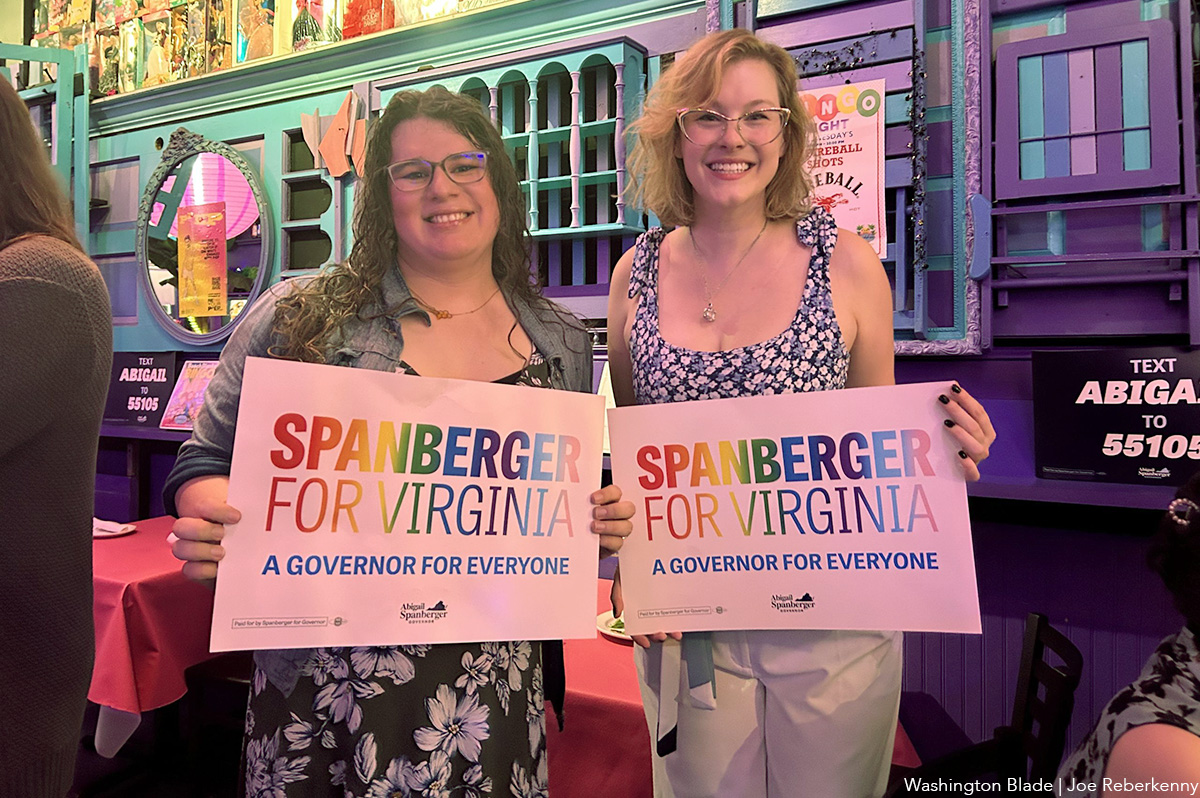
“The whole neighborhood’s here. All our friends are here,” said Annie Styles of Pentagon City. “It means the world to me to take care of each other. That’s what a good community does. That’s not what we’ve had with the Republicans here or across the nation for a really long time. It’s time to show that care. It’s time to make sure that good people are in a position to do good things.”
District of Columbia
Activists protest outside Hungarian Embassy in DC
Budapest Pride scheduled to take place Saturday, despite ban

More than two dozen activists gathered in front of the Hungarian Embassy in D.C. on Friday to protest the country’s ban on Budapest Pride and other LGBTQ-specific events.
Amnesty International USA Executive Director Paul O’Brien read a letter that Dávid Vig, executive director of Amnesty International Hungary, wrote.
“For 30 years Budapest Pride has been a celebration of hope, courage, and love,” said Vig in the letter that O’Brien read. “Each march through the streets of Budapest has been a powerful testament to the resilience of those who dare to demand equality, but a new law threatens to erase Pride and silence everyone who demands equal rights for LGBTI people.”
“The Hungarian government’s relentless campaign against LGBTI rights represents a worrying trend that can spread normalizing division and hatred,” added Vig. “Thank you for standing with us when we refuse to be intimidated.”
Council for Global Equality Chair Mark Bromley and two of his colleagues — Stephen Leonelli and Keifer Buckingham — also spoke. Health GAP Executive Director Asia Russell and Chloe Schwenke, a political appointee in the Obama-Biden administration who worked for the U.S. Agency for International Development, and Planned Parenthood staffers are among those who attended the protest.
(Washington Blade video by Michael K. Lavers)
Hungarian lawmakers in March passed a bill that bans Pride events and allow authorities to use facial recognition technology to identify those who participate in them. MPs in April amended the Hungarian constitution to ban public LGBTQ events.
Budapest Pride is scheduled to take place on Saturday, despite the ban. Hundreds of European lawmakers are expected to participate.
“Sending strength to the patriotic Hungarians marching tomorrow to advance human dignity and fundamental rights in a country they love,” said David Pressman, the gay former U.S. Ambassador to Hungary, on Friday on social media.
Sending strength to the patriotic Hungarians marching tomorrow to advance human dignity and fundamental rights in a country they love. Szabadság és szerelem. My past remarks on Budapest Pride: https://t.co/y1QhA9QouA
— David Pressman (@AmbPressman) June 27, 2025
-

 U.S. Supreme Court3 days ago
U.S. Supreme Court3 days agoSupreme Court upholds ACA rule that makes PrEP, other preventative care free
-

 U.S. Supreme Court3 days ago
U.S. Supreme Court3 days agoSupreme Court rules parents must have option to opt children out of LGBTQ-specific lessons
-

 India5 days ago
India5 days agoIndian court rules a transgender woman is a woman
-

 National5 days ago
National5 days agoEvan Wolfson on the 10-year legacy of marriage equality

